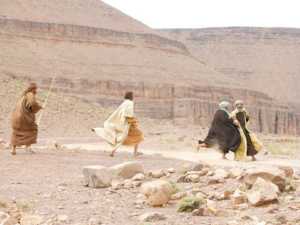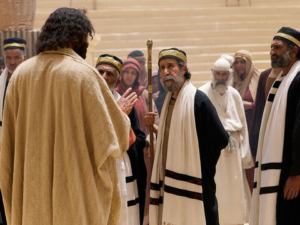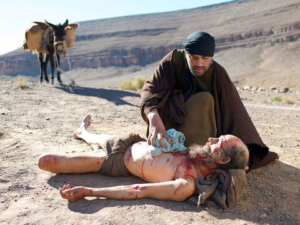
Good Monday morning my “Walking with Jesus” friends,
Do you enjoy remembering special times in your past? Our God given ability to remember, even in great detail, is a wonderful gift to us from God, do you agree? Have you noticed almost anything can trigger your memory? A sound, a smell, a taste, something someone says, of course pictures and so many other things.
Let’s rejoin Jesus and His disciples as they are heading toward Jerusalem from Jericho in the days following the miracles of Zacchaeus and the blind men, nearly 2000 years ago. Jesus had told His disciples what awaited them in Jerusalem but they simply could not believe it. Instead, as they walked along, I’m sure they often talked among themselves reflecting on the memorable nearly three years they’d had with Jesus.
Jesus had said and done so many remarkable things, there was so much to remember. Since they were walking the road from Jericho to Jerusalem I wonder if one of the disciples said, ‘Jesus, the road we’re walking today reminds me of a story you once told about a man who was attacked by robbers on this road and a Samaritan man who came by to help him.”
Dr. Luke is the only Gospel writer who gives us this remarkable story. Luke was not one of the disciples, but we know he interviewed many of them, so I wonder which one told Luke this story? Here’s how Luke records it: “Jesus said, ‘A man was going down from Jerusalem to Jericho, when he was attacked by robbers. They stripped him of his clothes, beat him and ran away, leaving him half dead. A priest happend to be going down the same road and when he saw the man, he passed by on the other side. So too a Levite, when he came to the place saw the man, but passed by on the other side of the road. But a Samaritan, as he traveled, saw the man and took pity on him. He bandaged up his wounds…then put the man on his own donkey and brought him to an inn and took care of him. The next day the Samaritan gave money to the innkeeper saying, ‘look after him and when I return, I will reimburse you for any extra expense you may have.” (Luke 10:30-35)

The disciples knew robberies on this stretch of road were not uncommon, but they were a group of perhaps 20 people walking with Jesus, so they had no fear of robbers on this day. But they also knew Jesus had not told that story as a warning to people about possible robberies along the Jericho road.
The stories Jesus told are sometimes called parables and they were for the purpose of personal application and deep introspection. As they walked along, I’m sure they occasionally looked up at the cliffs on the sides of the roads, or the caves and little canyons and they wondered. That’s what the parables of Jesus do, they cause us to look both around us and deep within ourselves and wonder.
The robbers of course represented greedy people with distorted values, little sense of right and wrong, and courage to take advantage of defenseless people. Do you know anyone like that? Do you see vulnerable people, especially elderly people or special needs people or children being taken advantage of by deceitful people or bullies? Oh there is no shortage of such people in our world, both the vulnerable and those who are ready to pounce on them. Are you alert enough, my friends, to detect both types of people in your world?
Of course, the focus of the story Jesus told, and these travelers discussed this day as they hiked the Jericho road, was not really about robbers or innocent victims, it was about those three people who passed by and saw the victim lying bleeding and naked alongside the roadside.
Jesus called the first man a priest. Then as now people we might classify as ‘priests’ are plentiful in every city and town in the world. They are the religious folks who everyone views as religious, sometimes even wearing the garb of their religion, with religious symbols around their necks or in our day maybe even religious symbols tattooed on their bodies! In some cases, they are devout, frequently seen going or coming from their religious gatherings, but all too often the real condition of their soul, their heart and mind, is very different from what they portray by their attire or claim in their religious talk.
Do you know any religious people who overlook the opportunity to help someone in need or disregard a cry for help or find themselves in places or behavior far away from God? Honestly now, as we look deeply within ourselves, is our spirituality simply religious tradition or rituals yet our hearts are far from God?
 The Levite, whom Jesus mentioned in His parable, would have been a Jewish man fortunate enough to be born into the tribe of Levi. That was the tribe of Moses and Aaron. These were people the Jews understood to be privileged spiritually because God’s blessing was upon them in a special spiritual way. In turn, the people could expect these to be generous, compassionate people of God with hearts unusually devoted to honoring God in all aspects of their lives. That’s why it was almost unthinkable that a Levite would do as Jesus had portrayed in His parable.
The Levite, whom Jesus mentioned in His parable, would have been a Jewish man fortunate enough to be born into the tribe of Levi. That was the tribe of Moses and Aaron. These were people the Jews understood to be privileged spiritually because God’s blessing was upon them in a special spiritual way. In turn, the people could expect these to be generous, compassionate people of God with hearts unusually devoted to honoring God in all aspects of their lives. That’s why it was almost unthinkable that a Levite would do as Jesus had portrayed in His parable. None of the disciples were Levites, as far as I know, but all of them, because of their time with Jesus, were finding their hearts and minds changed profoundly as they learned to see and care about people, the way Jesus saw and cared about people.
Samaritans were disgusting to Jewish people. They were the inhabitants of the area north of Jerusalem between Judea and the Galilee regions. They were descendants of the 10 northern tribes of Israel who had rejected God and been led by idol worshiping kings and were finally overthrown by the Assyrian empire 700 years before Jesus was born. In their victory the Assyrian military brought in captives from other nations they had conquered, and they intermarried with those defeated Jews and thus their Hebrew heritage and bloodline from Abraham was lost through the centuries. Animosity was palpable and Jews avoided any contact with Samaritans at all times in all places.
For those reasons and more the good Samaritan, who stopped to help the man victimized by the robbers on the Jericho road, was far beyond what any good Jew could imagine. Because of the prejudices which existed in those days the followers of Jesus had no trouble personalizing this powerful parable story and asking themselves what they would do if the victim were a Samaritan or a Leper or a Roman solider or a tax collector or a Gentile! Now let’s pause right here for a moment. It should be very easy for us to put ourselves into the story, wherever you live around the world.

As you are walking along or driving in your car or riding your bicycle and you see someone on the side of the road, what do you do? If they were obviously victim of a tragedy and bleeding, probably you’d stop and see if you could help, right? But what if they do not appear to be in crisis, simply in need… what then? What if their skin color is different from yours, or their attire is shabby, or they are smoking or holding an alcohol bottle or ____________ you fill in the blank? What are those behaviors or appearances which warn us to stay clear of that person?
But as the disciples walked with Jesus that day and discussed His story about the good Samaritan, I wonder if what really challenged them was not so much that he stopped to aid the bleeding victim, but that the Samaritan went out of his way to take the victim to the inn and stayed the night to care for him and left money with the innkeeper to pay for his care until he returned.
Now friends’ what application can you make of that extreme compassion in your world, your relationships, your own heart? When Jesus had told this story He had said this as a summary application: “Love the LORD your God with all your heart, soul, strength and mind, and love your neighbor as yourself.” (Luke 10:27) As they walked along with Jesus that day not one of those in the group could have predicted what would happen to them over the next two weeks.
But Jesus knew it all, for He could foresee the future as clearly as it was happening in that moment. I imagine the disciples may have been caught up in a discussion about the Good Samaritan on the Jericho road, and what they’d seen with Zaachaeus and the blind men in Jericho, but Jesus was very likely deeply pondering what He knew awaited Him at the end of this road in Jerusalem in the coming Passover days.
I wonder as Jesus walked along, did He look at each of His disciples seeing in His mind what they would be saying and doing only a few days in the future as Jesus would ride a donkey over the Mount of Olives, or they’d be together in the Upper Room for Passover, or they’d be in the quiet Garden of Gethsemane together when Judas would come and they would run away in to the shadows?
So as Jesus looks at you and me today my friends, He can see what will be happening in our lives over this coming Passover/Easter season and I wonder what He sees will be our attitudes and actions in these next days? Robber, innocent victim, Priest, Levite or Samaritan? Who in this story of Jesus is more like the person Jesus know you and I really are, down deep in our soul?
Bible images provided with attribution to www.LumoProject.com.
Have a comment or question about today’s chapter? I’m ready to hear from you, contact me here.

Pastor Doug Anderson 262.441.8785
“Let us run with perseverance the race marked out for us, with our eyes fixed on Jesus…” (Heb. 12:1,2)
Archived back issues of “Walking with Jesus” and other resources are available by clicking here to open our ‘home page’ (or go to HOME at upper right of this page).
Share with friends. Subscribe below for daily “Walking with Jesus”.


